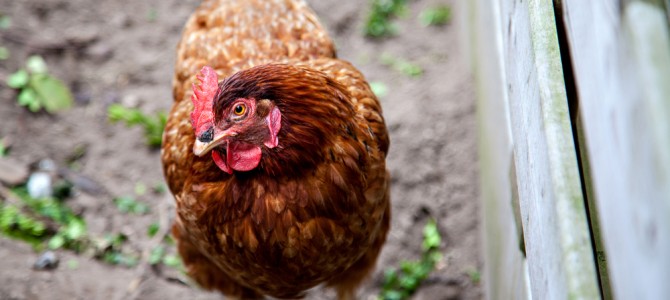
Many urban homeowners increasingly desire to keep small flocks of chickens in their backyards, and with good cause. There is no reason every family in this country that can run a flock of chickens in their backyard should not. This perfectly logical and reasonable habit—backyard chicken farming—has been buried under a great deal of hipster elitism (from many of the backyard chicken farmers themselves) and sneering derision (from their critics). Please try to ignore these detractors. If you can play host to backyard chickens, you should.
It is, in many urban localities, easier said than done. This normal and praiseworthy practice, which has been gaining ground in many cities across the country, has come under fire from both pearl-clutching busybodies and incompetent health inspectors and animal welfare agents, all of whom are under the impression that backyard chicken farming is both frightening and dangerous.
These are lies—it is neither—although it is tough to get many of the busybodies and public officials to see this, particularly when the latter stands to make money off the lies.
Cue the Chicken Nazis
In my hometown of Richmond, Virginia, for instance, to set up a chicken flock, one must (1) apply for a $60 permit (which expires annually), (2) submit to a background check, (3) submit to an on-site inspection of one’s premises, (4) agree to randomized inspections in the future, (5) build your coop at least 15 feet from any dwelling, at the rear of your property, with a fence around it (with slats no greater than two inches apart), and (6) limit yourself to four chickens total.
This is absurd political theater. It is regulatory folderol written by people who have not even the faintest idea what they are regulating.
Backyard chickens require none of these complex bylaws. There are ways to screw up backyard chicken farming, but not in any way that a randomized inspection by a clueless animal welfare officer could preempt. Animal husbandry is overwhelmingly an actualized vocation. It demands both careful attention and a kind of sylvan intimacy, neither of which can be found on the clipboard of some stiff from the city government or in the perfectly ridiculous zoning regulations that mandate the explicit placement of your backyard coop.
These kinds of laws should be repealed, or never passed in the first place. Backyard chicken farming should be liberated from this kind of dreary legalistic minutiae. And once your local government has legalized this practice, you should do it.
Keeping Chickens Is Good for You
Why? For starters, there are the health benefits: if you eat a lot of eggs, then there is every reason to switch to fresh eggs from hens roaming in your backyard. A wide body of evidence suggests eggs raised under these optimal conditions are higher in critical vitamins, minerals, and fatty acids, and anyone who has eaten these eggs can attest that these healthy qualities greatly inform a superior taste.
Crack an egg from a well-tended backyard chicken and you’ll immediately notice the thick, well-formed eggshell surrounding a rich orange yolk. Contrast that with the “store-bought” egg’s thin, brittle shell and a pale lackluster yolk. This is evidence enough for even a small child to understand: healthy animals produce healthy food that is good for people to eat.
Eggs from backyard chickens taste better, and they are better. But the health from a small chicken flock does not turn merely on the eggs it produces. Chickens also produce manure, which—if properly managed—can be turned into compost to run a stupendous garden nearby. There is a fair amount of hand-wringing done over how unsafe chicken manure is, but this is really mostly a matter of logistics, not substance: if you don’t go swimming in the stuff or plastering it to your hangnails, you’ll be fine.
Chicken manure requires a fair amount of carbon—dead leaves and straw, for instance—to reach the optimal composting balance (and also to neutralize the smell, which—if left untreated—is rather pugnacious). Over a few seasons or a year, many people build up a thick bed of leaves, straw, and chicken manure in the chicken coop or the chicken yard. Then it’s ready to be formed into a compost pile or else just turned directly in the earth for decomposition.
Waste Not, Want Not
You can, in other words, put your chickens to work double time: laying eggs and building compost, which leads to healthy soil, which ultimately leads to healthy tomatoes, cucumbers, peppers, and carrots. Chickens do not simply lay eggs; they build side salads, too.
Yet chickens are useful not merely as producers of food but as practical disposers of it, too. A flock of chickens will require a certain amount of “layer feed” to thrive, but they can also be fed from the scraps of your kitchen—and you’d be amazed at how many scraps, and how much edible food, you throw away on a regular basis.
There is, of course, the standard food waste: vegetable cores and peels and stems, bread crusts, apple cores, melon rinds. All of that can go to the chickens. But there is also the astonishing amount of food that Americans habitually waste on a regular basis: more than 10 percent of your pantry that you probably toss out simply due to spoilage or expiration or simple carelessness. That can also go to the birds.
You could, of course, stop wasting so much food, and that would be good. But a certain amount of food wastage is probably inevitable. That is the beauty of it: with chickens nearby, the term “food wastage” becomes something of an antiquated and incomprehensible concept. Aside from the slim number of things chickens can’t safely digest, there is simply no reason all of that chicken-friendly food should go to a landfill, where it rots, instead of your backyard, where it gets turned into eggs and gardens.
Chickens Build Character
All of these benefits are more or less quantifiable, but one is slightly less easy to measure but no less important: animal husbandry is good for the soul. Do not mistake this for something it is not. At least among the urban set, the pragmatic realities of animal farming tend to get lost under a lot of trendy pretensions and sentimental baloney. But there is really no need for this, and it is easily avoided.
Raising animals—even a little flock of dimwitted backyard chickens—teaches us practical and visceral lessons about ecology, economics, attentiveness, time management, health, weather and locale, soil health, and patience. Spend a month with a backyard chicken flock and you’ll understand. All of these things are critical to the proper formation of the human heart and the human mind. Because of this, a flock of backyard chickens will particularly benefit your young children, who should learn these lessons early and often.
Backyard chicken farming is of course often dismissed by a hardheaded sort of person who thinks of it as a retrograde throwback to preindustrial days. But this is wrong. Urban animal husbandry is in fact as postindustrial a consumer choice as any you might make; perhaps even more so, because it requires and is a result of more knowledge and more careful attention to one’s health and abilities than simply buying your eggs from a grocer. Problems will arise, of course—but the same could be said about owning a car, and nobody wants to give up owning a car because it might have problems.
One also often hears the complaint that it is too expensive to run your own chicken flock. This is easily avoided by eschewing some of the modish traps many backyard “flocksters” fall into. Do not, for example, buy a fancy pre-made chicken coop: they are ridiculously expensive and needless. Instead, build a simple coop with as many wood scraps as you can. Many people feed their chicken rather pricey organic feed, but you can get excellent eggs with “conventional” layer feed as well. There are plenty of ways to save money without compromising the best values of backyard farming.
Obviously, Get the Basics Right
Sadly, many wannabe flock runners have given this practice a bad name because they were unprepared for the realities of chicken farming: there have been reports of urban farmers dropping their chickens off at animal shelters after the birds have stopped laying.
It would behoove anyone getting into the backyard chicken business to know this: chickens do stop laying after a few years, at which point you will have to make the choice: you will either have to keep your unproductive chicken until it dies a natural death (likely years later), or else butcher it (or give it to a farmer who will butcher it for you). To kick a chicken to the curb at an animal shelter is to take the coward’s way out, and there is no place in animal husbandry for cowards.
Last but certainly not least, there is the ethical aspect to consider. The modern “industrial” egg farm is, for the most part, a profoundly ghastly hellscape in which chickens are crammed into tiny cages for most of their lives in direct contravention of their evolutionary tendencies. This is undoubtedly a victory for industry (at the expense of most laying hens, of course), but it is neither scientific nor humane. It is instead representative of a kind of crude, antediluvian brutality, no good to anyone: the long-suffering chickens, the indebted farmers, or the consumers who buy the crummy eggs at the end of the long chain of consumerism. This is a wasteful and awful system.
Vegans are weird, and they get a lot of things wrong, but on the merits of factory farming they are 100 hundred percent correct. If you have the space and the resources (both of which you need not very much for this), there is no real case against keeping backyard chickens. It is an historically normal practice, and in an age of cheap raw materials, the knowledge base of the Internet, and the obvious health benefits of better food, it is more justifiable than ever.
Backyard chickens are good for everyone and everything involved: your family, your land, the chickens, and the health of your spirit and your body. It has never been easier for urban and suburban residents to be farmers—and the arguments against it have never looked sillier and less convincing. Go do it, and enjoy the eggs.









